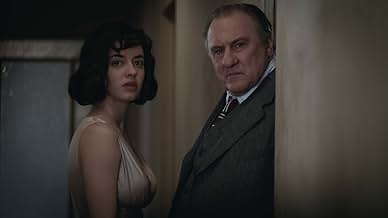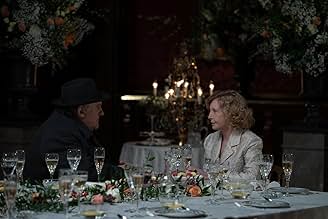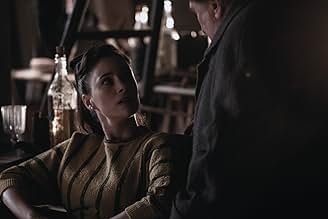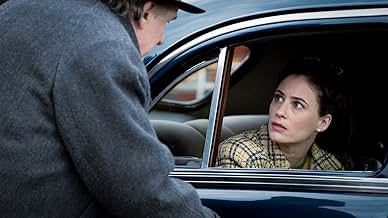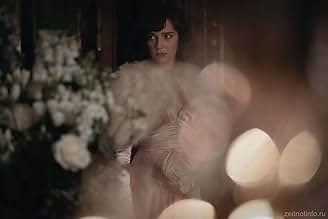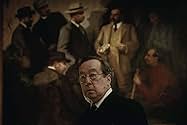AVALIAÇÃO DA IMDb
5,9/10
3,6 mil
SUA AVALIAÇÃO
Em Paris, uma jovem é encontrada morta em uma praça parisiense, usando um vestido de noite. O Comissário Maigret tentará identificá-la e depois entender o que aconteceu com a vítima.Em Paris, uma jovem é encontrada morta em uma praça parisiense, usando um vestido de noite. O Comissário Maigret tentará identificá-la e depois entender o que aconteceu com a vítima.Em Paris, uma jovem é encontrada morta em uma praça parisiense, usando um vestido de noite. O Comissário Maigret tentará identificá-la e depois entender o que aconteceu com a vítima.
- Direção
- Roteiristas
- Artistas
Hervé Pierre
- Docteur Paul
- (as Hervé Pierre de la Comédie Française)
- Direção
- Roteiristas
- Elenco e equipe completos
- Produção, bilheteria e muito mais no IMDbPro
Avaliações em destaque
The story is good enough to be invested in the movie, actors are great too but I don't know why there are so many shots with weird little zoom and shaky cam. It doesn't seem to evoke anything, just a terrible way to shoot and direct..
Gérard Depardieu takes up the pipe to play the indefatigable commissaire Maigret. He is such an obvious casting choice with his understated intelligence, gentle wit, and hulking physique that it's a wonder he hadn't played the part before. At age 73, he is quite obviously too old for the part. He spends most of the movie leaning or sitting down and the few times we see him walk he seems barely able to amble along. But this seems to be how director Patrice Leconte has reimagined the character anyway.
His Maigret is an old man, easily tired, contemplating his mortality. He is introduced while in the middle of a doctor's appointment. He's in fine physical health we're told but the weight of the world seems to be on his shoulders. No, this Maigret is not alright. There's something severely wrong with him, a kind of emptiness eating him from the inside. He's dying and he's aware of it.
Another obvious fit for a Maigret movie is director/writer Patrice Leconte who had previously made the superb Simenon adaptation "Monsieur Hire". His direction here is curiously frigid, styleless and distant. This is not an easy movie to watch. It's so weighed down with sorrow that it becomes downright oppressive. It plays out in vast open spaces cluttered with garbage - long discarded, broken things, once useful now forgotten and in the way. His Paris resembles a post-apocalyptic wasteland which, like the one in Richard Lester's "Bed Sitting Room", bears certain signs that it was once inhabited by a civilization.
A clue as to Leconte's artistic intentions is hidden in a sombre and impactful scene in which Maigret interviews an elderly Jewish man (André Wilms) looking for a daughter he'll never find. He sits in his office surrounded by antique chairs stacked on antique desks and wrapped in cobwebs and dust. "When you lose your child you lose everything," he says, "There's nothing left. Only the night."
The plot follows Maigret as he investigates the death of a young woman found stabbed and discarded on the street like a piece of trash. He doesn't know her name or anything about her but slowly, by following the smallest clues, he pieces together her entire personality. Before he even identifies her he can say things like "she would never do that" with absolute certainty.
He finds this out by talking to various people, some of whom knew her, some of whom didn't, and some of whom are lying they didn't. These people include an actress who isn't an actress living her life on sets opening fake doors, a rich and arrogant man who lives with his mother and relies entirely on her platitudes, a judge obsessed with his pet fish, and a pharmacist who issues drugs based on her customer's faces.
The performances are excellent especially that of Jade Labeste as Betty, a poor girl Maigret encounters on the streets and whom he is determined not to allow to suffer the same fate as the girl whose death he is investigating. Labeste's charismatic, world-weary performance is the standout of the film and has a certain classical quality that reminded me of the French cinema of the 1960s. I can't wait for her to lead a film all on her own.
These small characters are the most important and their plights and the world they inhabit together are at the centre of the film. In that sense, this is one of the most accurate Simenon adaptations. What Leconte's film doesn't manage, however, is the delicate balance between character study and thriller.
Simenon knew that his psychological treatise needed a solid motor in the form of a mystery plot to keep the readers interested and the story on track. Leconte, in building up the characters, far too often lets the plot fall by the wayside. The result is a film which is intriguing and atmospheric but frequently aimless, uneven and taxing on its audience's patience.
He has little interest in the whodunnit aspect of the story which results in "Maigret" lacking a solid framework and, more importantly, a sense of narrative propulsion. Consequently, the pacing suffers, feeling alternatively too slow or too fast depending on Leconte's interest in the given scene. Exposition is quickly dealt with and the plot frequently gets muddy.
In "Maigret", I admired the ambition more than the result and the whole is less than the sum of its parts. The production design, the idea, and the performances are all superb but the film collapses under its own weight. It's a dour, depressing, hopeless sit without a strong narrative to buoy its heady artistic intentions.
His Maigret is an old man, easily tired, contemplating his mortality. He is introduced while in the middle of a doctor's appointment. He's in fine physical health we're told but the weight of the world seems to be on his shoulders. No, this Maigret is not alright. There's something severely wrong with him, a kind of emptiness eating him from the inside. He's dying and he's aware of it.
Another obvious fit for a Maigret movie is director/writer Patrice Leconte who had previously made the superb Simenon adaptation "Monsieur Hire". His direction here is curiously frigid, styleless and distant. This is not an easy movie to watch. It's so weighed down with sorrow that it becomes downright oppressive. It plays out in vast open spaces cluttered with garbage - long discarded, broken things, once useful now forgotten and in the way. His Paris resembles a post-apocalyptic wasteland which, like the one in Richard Lester's "Bed Sitting Room", bears certain signs that it was once inhabited by a civilization.
A clue as to Leconte's artistic intentions is hidden in a sombre and impactful scene in which Maigret interviews an elderly Jewish man (André Wilms) looking for a daughter he'll never find. He sits in his office surrounded by antique chairs stacked on antique desks and wrapped in cobwebs and dust. "When you lose your child you lose everything," he says, "There's nothing left. Only the night."
The plot follows Maigret as he investigates the death of a young woman found stabbed and discarded on the street like a piece of trash. He doesn't know her name or anything about her but slowly, by following the smallest clues, he pieces together her entire personality. Before he even identifies her he can say things like "she would never do that" with absolute certainty.
He finds this out by talking to various people, some of whom knew her, some of whom didn't, and some of whom are lying they didn't. These people include an actress who isn't an actress living her life on sets opening fake doors, a rich and arrogant man who lives with his mother and relies entirely on her platitudes, a judge obsessed with his pet fish, and a pharmacist who issues drugs based on her customer's faces.
The performances are excellent especially that of Jade Labeste as Betty, a poor girl Maigret encounters on the streets and whom he is determined not to allow to suffer the same fate as the girl whose death he is investigating. Labeste's charismatic, world-weary performance is the standout of the film and has a certain classical quality that reminded me of the French cinema of the 1960s. I can't wait for her to lead a film all on her own.
These small characters are the most important and their plights and the world they inhabit together are at the centre of the film. In that sense, this is one of the most accurate Simenon adaptations. What Leconte's film doesn't manage, however, is the delicate balance between character study and thriller.
Simenon knew that his psychological treatise needed a solid motor in the form of a mystery plot to keep the readers interested and the story on track. Leconte, in building up the characters, far too often lets the plot fall by the wayside. The result is a film which is intriguing and atmospheric but frequently aimless, uneven and taxing on its audience's patience.
He has little interest in the whodunnit aspect of the story which results in "Maigret" lacking a solid framework and, more importantly, a sense of narrative propulsion. Consequently, the pacing suffers, feeling alternatively too slow or too fast depending on Leconte's interest in the given scene. Exposition is quickly dealt with and the plot frequently gets muddy.
In "Maigret", I admired the ambition more than the result and the whole is less than the sum of its parts. The production design, the idea, and the performances are all superb but the film collapses under its own weight. It's a dour, depressing, hopeless sit without a strong narrative to buoy its heady artistic intentions.
From the director of the excellent Monsieur Hire - still one of the best Simenon adaptations - you certainly expect more than this tired, geriatric and rather pedestrian treatment. It's all very dark bluish, with unsteady camera, listless performances and general air of fatigue (it opens with Maigret's visit to the doctor).
It's a pity Lecont and Depardieu couldn't make Maigret sooner, in their better years (the novel was filmed before - much more lively if not particularly excitingly - with Jean Richard in 1973).
It's a pity Lecont and Depardieu couldn't make Maigret sooner, in their better years (the novel was filmed before - much more lively if not particularly excitingly - with Jean Richard in 1973).
Maigret's authenticity in every aspect is most remarkable. Expressive visuals of a decay to which dreamers flock. A hulking father too old and worn to save daughters of the city presented with a effortless performance. Though it's origins are infrequent Maigret is a welcoming experienced experience .
Louise (Clara Antoons) is renting a very expensive dress to attend her friend Jeanine's (Melanie Bernier) engagement party. She is being engaged to Laurent Clermont (Pierre Moure), a party hosted by his mother (Aurore Clement). Louise is not welcome, and is being threatened by Jeanine and Laurent.
The next morning, Louise is found in the streets, dead, stung with a knife. Commissioner Maigret (Gérard Depardieu) is taking over the case. He's not a young man anymore and has just been told by his doctor to drop his favourite pass time thing, smoking his pibe. That really doesn't help how he feels at the moment, he's never hungry, can't sleep, he's in quite a bad mood.
He really doesn't have a clue about the victim, not her name nor her address. Finding a medicine bottle, he finds out where Louise lived. There he meet Jeanine for the first time. She's an actor, and after meeting Louise on a train, she helps her to a place to stay, and a bit of work at the film studio.
Knowing that about Louise, Maigret tries to fit the pieces together, trying to find out more about the life of the murdered girl. He therefore tries to find a girl with just about the same characteristics, that's how he meets Betty (Jade Labeste). She's earning her money through prostitution. She has nowhere to live, but Maigret brings her to the available apartment of Louise's. They somehow forms a kind of friendship, and to solve the case, he luckily gets her help. Coming up with the quite surprising ending.
Maigret has been played by a lot of actors, Rowan Atkinson being the latest with a TV series. Here in 2022 he's being played by Depardieu, who's visibly are getting older. He's bringing a very slow walking Maigret to the streets of Paris. As always he plays very convincingly. But overall the best performance must be Jade Labeste's portrait of Betty. A film worth watching.
The next morning, Louise is found in the streets, dead, stung with a knife. Commissioner Maigret (Gérard Depardieu) is taking over the case. He's not a young man anymore and has just been told by his doctor to drop his favourite pass time thing, smoking his pibe. That really doesn't help how he feels at the moment, he's never hungry, can't sleep, he's in quite a bad mood.
He really doesn't have a clue about the victim, not her name nor her address. Finding a medicine bottle, he finds out where Louise lived. There he meet Jeanine for the first time. She's an actor, and after meeting Louise on a train, she helps her to a place to stay, and a bit of work at the film studio.
Knowing that about Louise, Maigret tries to fit the pieces together, trying to find out more about the life of the murdered girl. He therefore tries to find a girl with just about the same characteristics, that's how he meets Betty (Jade Labeste). She's earning her money through prostitution. She has nowhere to live, but Maigret brings her to the available apartment of Louise's. They somehow forms a kind of friendship, and to solve the case, he luckily gets her help. Coming up with the quite surprising ending.
Maigret has been played by a lot of actors, Rowan Atkinson being the latest with a TV series. Here in 2022 he's being played by Depardieu, who's visibly are getting older. He's bringing a very slow walking Maigret to the streets of Paris. As always he plays very convincingly. But overall the best performance must be Jade Labeste's portrait of Betty. A film worth watching.
Você sabia?
- CuriosidadesMaigret's comment "But this is not a pipe ... That's a Belgian joke to cheer us up." (from English subtitles) refers to René Magritte's painting, 'The Treachery of Images' (aka 'This Is Not a Pipe' or 'Ceci n'est pas une pipe').
- ConexõesFeatured in Rembob'Ina: Maigret (2022)
Principais escolhas
Faça login para avaliar e ver a lista de recomendações personalizadas
- How long is Maigret?Fornecido pela Alexa
Detalhes
- Data de lançamento
- Países de origem
- Central de atendimento oficial
- Idiomas
- Também conhecido como
- Maigret
- Locações de filme
- Le Vésinet, Yvelines, França(Clermont-Valois' manor, 52 Av. G. Clemenceau)
- Empresas de produção
- Consulte mais créditos da empresa na IMDbPro
Bilheteria
- Faturamento bruto mundial
- US$ 5.942.128
- Tempo de duração1 hora 29 minutos
- Cor
- Proporção
- 2.35 : 1
Contribua para esta página
Sugerir uma alteração ou adicionar conteúdo ausente

Principal brecha
What is the Canadian French language plot outline for Maigret e a Jovem Morta (2022)?
Responda

